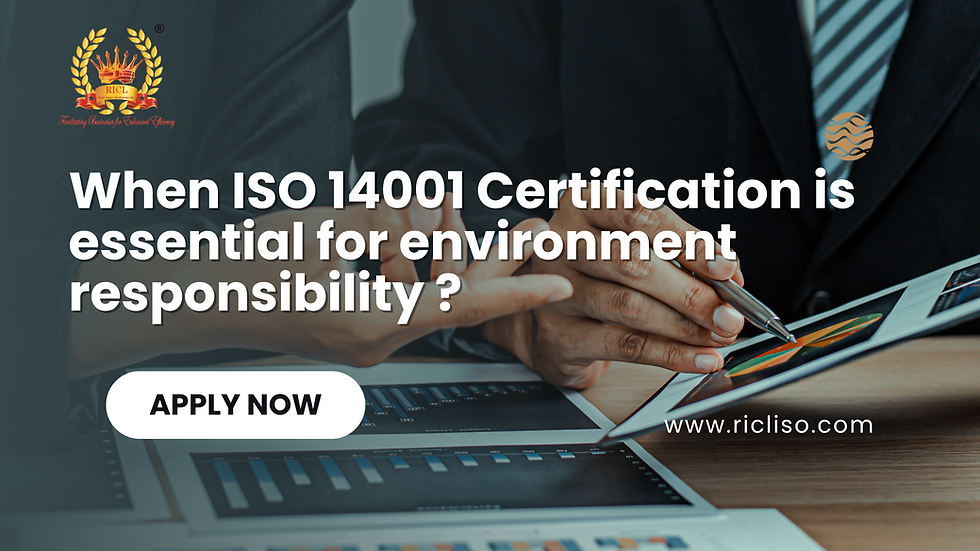When ISO 14001 Certification is essential for environment responsibility?
- teamitricl
- Aug 2, 2025
- 2 min read

ISO 14001 Certification is essential for organizations seeking to demonstrate their commitment to environmental responsibility and sustainability. Here’s why ISO 14001 Certification is crucial in this context:
1. Framework for Environmental Management
· Structured Approach: ISO 14001 provides a systematic framework for organizations to establish, implement, maintain, and continually improve an Environmental Management System (EMS). This includes identifying environmental aspects, assessing impacts, and implementing controls to mitigate adverse effects on the environment.
· Legal and Regulatory Compliance: ISO 14001 helps organizations comply with environmental laws, regulations, and other requirements relevant to their operations. By ensuring compliance, organizations reduce the risk of legal sanctions and regulatory penalties.
2. Environmental Impact Reduction
· Resource Efficiency: ISO 14001 encourages organizations to optimize resource use, minimize waste generation, and reduce consumption of energy and materials. This contributes to resource conservation and operational efficiency.
· Pollution Prevention: The standard emphasizes pollution prevention measures to minimize emissions, discharges, and waste generation. By implementing proactive measures, organizations reduce their environmental footprint and mitigate negative impacts on ecosystems and communities.
3. Enhanced Corporate Reputation
· Stakeholder Expectations: ISO 14001 Certification demonstrates a commitment to environmental stewardship and sustainability, meeting stakeholder expectations for responsible business practices. This enhances corporate reputation and credibility among customers, investors, regulatory authorities, and the public.
· Brand Differentiation: Certified organizations distinguish themselves in the marketplace as environmentally responsible leaders. Customers increasingly prefer products and services from companies that prioritize environmental sustainability.
4. Risk Management
· Risk Identification and Mitigation: ISO 14001 requires organizations to assess environmental risks and implement controls to manage and mitigate these risks effectively. This proactive approach reduces the likelihood of environmental incidents, regulatory violations, and associated costs.
· Emergency Preparedness: Organizations prepare for and respond to environmental emergencies, such as spills or accidents, minimizing potential impacts on the environment and surrounding communities.
5. Continuous Improvement
· Commitment to Continual Improvement: ISO 14001 promotes a culture of continuous improvement in environmental performance. Organizations regularly monitor and evaluate their EMS, identify opportunities for improvement, and implement corrective actions to enhance environmental outcomes.
· Lifecycle Perspective: The standard encourages organizations to consider the environmental impacts of their products and services throughout their lifecycle. This includes raw material sourcing, production, use, and end-of-life disposal or recycling, promoting sustainable practices across value chains.
6. Global Recognition and Market Access
· International Recognition: ISO 14001 Certification is globally recognized and respected as a benchmark for environmental management excellence. It facilitates market access by demonstrating compliance with international standards and customer requirements.
· Supply Chain Expectations: Increasingly, customers and business partners expect suppliers to demonstrate environmental responsibility through ISO 14001 Certification. Certification enhances competitiveness and strengthens relationships within supply chains.
Conclusion
ISO 14001 Certification is essential for organizations committed to environmental responsibility by providing a structured framework for environmental management, reducing environmental impacts, enhancing corporate reputation, managing risks, promoting continuous improvement, and facilitating global market access. By achieving ISO 14001 Certification, organizations demonstrate leadership in sustainability, meet stakeholder expectations, and contribute to a sustainable future for the planet and communities worldwide.






Comments